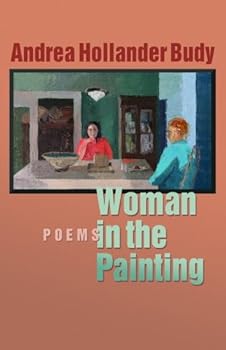Woman in the Painting
No Synopsis Available.
Format:Hardcover
Language:English
ISBN:1932870113
ISBN13:9781932870114
Release Date:July 2006
Publisher:Autumn House Press
Length:95 Pages
Weight:0.35 lbs.
Related Subjects
PoetryCustomer Reviews
3 ratings
Loved It
Published by Thriftbooks.com User , 14 years ago
I decided to buy "Woman in the Painting" after hearing Budy read some of her poetry in person. As she read, I was impressed with the depth of feeling she captured in her writing. I ordered the book hoping the rest of her poetry would be as honest and reflective as what I had heard her read. Just a few minutes ago I finished the book and, in short, her bold style is consistent between what I heard her read and the rest of her writing. I definitely wasn't disappointed. To be more specific, I was especially drawn in by the sensitive nature of the subjects Budy explores in her poetry. In "Woman in the Painting," her poems include a poetic biopsy of her mother's emotional pain and hidden insecurities, the awkwardness of some of her own sexual experiences, memories of her parents' declining health and deaths, her disgust with her grandfather's chauvinistic sense of entitlement, as well as a few deliberate dissections of social inequities. To help her reader understand, Budy begins most poems with a description of some inanimate object or commonplace event that we can relate to. The connections she makes between her feelings and these objects or events are startlingly precise. I would recommend this book to anyone. The first set of poems is pretty sensual, which could be uncomfortable for some readers. Otherwise, just about any serious reader can appreciate the depth in Budy's writing and the attention she pays to the details of her own feelings.
Budy Paints on Life's Canvas
Published by Thriftbooks.com User , 18 years ago
In her collection of poems Woman in the Painting Andrea Hollander Budy paints images of tremendous happiness and pain in a way that is both deeply personal yet incredibly broad. The collection as a whole is a reflection on life, of both the joys and the sorrows brought on by extremely significant events which are interwoven with seemingly ordinary, mundane things. Each person experiences life differently, and Budy acknowledges this early on. From the beginning she explains that "we bring our own heat to the canvas" (3), expressing the idea that each individual life is unique and that no one else can experience or "paint" our lives the way that we would; however, it seems that Budy writes in a way that connects to readers by using her own life as a canvas on which to express events of tragedy and joy common to all people. Her poems about the loss of both of her parents, loss of friends, and love are personal enough that they are not our own experiences, yet they are broad enough that they speak to us just the same. For example, in "Room 246" her poem about being so young at the time of her mother's sickness convinced me to imagine myself in the same situation; while I could not relate to her exact experience, I could certainly understand it. Budy writes clearly as a woman, reflecting on family, children, and men in her life. Her poems show both the strength and vulnerability of a young girl growing up to become a mother herself. She takes readers with her from the anxiety of exposing herself as a writer in "First Books" (9), to her "First Love," admitting "I haven't forgotten you" (16). In the next section of the collection she deals with her mother's cancer diagnosis and ultimate death, her mother's worth as a woman ("Nineteen-Thirty-Eight") and the grieving of her family("Sorrow"). In the poem "The Woman in the Painting" Budy shows that all women have a story, even if they are only in a picture; that every painting can be related to a real person. She examines the facades people put up to appear a certain way to others, explaining that the way something looks is merely an appearance not necessarily a truth. Along with these ideas of appearances and the life of her mother, Budy writes about her father and his illness. Through his suffering she continues to examine concepts of gender relations in her life. For example she writes "I'm not sure if he cared for me more than for my brother" in "My Father's Green Flannel Shirt" (55). Her relationship with her father differs from that with her mother: a mother is someone to aspire to--someone whose traits, as a daughter, you expect to inherit; a father is someone meant to protect you, be the stability in your life. Budy's relationships with her parents seem to be like this, and as a daughter myself, I found her poems about parents quite relatable. In class recently my professor said "Stories are framed just like pictures are framed," and it immediately reminded me of Budy's p
New Book from Fine Poet
Published by Thriftbooks.com User , 18 years ago
In this highly readable volume, Andrea Hollander Budy portrays the live of the title Woman in the Painting in four stages. We see the woman's adolescence and young womanhood, full of love, loss, and yearning. In Part II, we flash back to her mother's life, which was triumphant despite a harsh upbringing and an early death. In Part III, we see her successful father and his slow descent into dementia. Finally, in Part IV, we hear the voice of the mature woman, wise to the world as well as to herself. Anyone who likes the poetry of recent laureates Collins and Kooser will love this volume.






